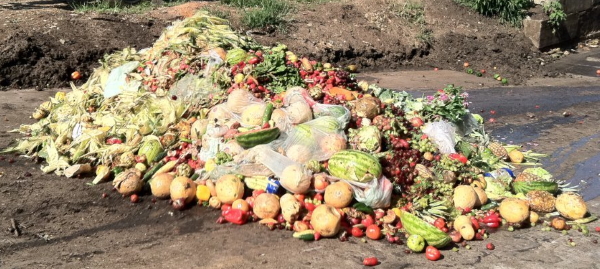We’ve asked our #DataImpactFellows to write a post on the theme of ‘change’.
 Christian Reynolds reflects on data becoming available during the pandemic in his research areas of food sustainability and waste, and how the Covid-19 crisis is changing how he will work going forward.
Christian Reynolds reflects on data becoming available during the pandemic in his research areas of food sustainability and waste, and how the Covid-19 crisis is changing how he will work going forward.
The Covid-19 pandemic has led to major disruptions in the UK and global food systems, and has fundamentally changed everyone’s day-to-day lives.
This change was magnified for me as in early March 2020 I moved down to London to take up a Senior Lecturer position at the Centre for Food Policy, at City University of London. This is a really exciting move for me, as the Centre for Food Policy has long been one of the UK’s leading interdisciplinary research units working to shape a food system that improves the health of people, the environment and the economy.
However, as soon as I moved, the lockdown came into force; teaching moved online; existing research projects were suspended; and we all adjusted to the “new normal”.
In the first few weeks of lockdown – like many data analysts – I found myself playing ‘catch up’. I was frantically trying to access databases and studies from across the globe to understand how the Covid-19 crisis was affecting the UK and global food system, and understand what I could do to help.
I was fortunate that I was involved in three pilot surveys in the field as lockdown fell:
- one survey on cooking habits (and food waste)
- one on perceptions of food safety
- one on food insecurity in university students
Three very topical areas for understanding how Covid-19 and the lockdown has changed food behaviour.
These gave me some unique insights that I have tried to communicate to other researchers, analysts in government departments, and the EFRA committee enquiry (see here and here for my evidence submissions, – if you are interested to have a look at the data, I will be putting it into a safeguarded archive as soon as it is anonymised.)
I was also fortunate that other UK organisations also pushed surveys into the field as the lockdown started. The surveys by the Food Foundation, WRAP, Hubbub, Kantar/AHDB, and the Food, Farming & Countryside Commission, all proved invaluable to ‘triangulate’ my own findings against, and to better understand what is happening in the UK food system.
In short, the UK food system changes are worrying:
- household food insecurity has increased by at least 10%-20% since lockdown and the Covid crisis;
- cooking and shopping practices have changed since lockdown;
- household food waste behaviour has changed since lockdown.
Different population segments (age/income) have self reporting different experiences and changes. For instance, different ages are wasting more or less than usual. The WRAP report describes this complexity well:
“three in ten (30%) 18-24s report higher levels of food waste, compared to 11% of those aged 65+. It is important to be clear that this is not saying that all younger citizens have high levels of food waste while none of those aged 65+ do. There are older citizens (around one in ten) who report higher levels of food waste, and likewise younger citizens who do not report higher levels of food waste (around seven in ten). The results simply indicate that, on balance, older age groups are less likely to report high levels of food waste.”
Image: pile of food waste
You may notice that these datasets and reports are not from academic institutions or government departments, (nor even the UK Data Dervice – though the Understanding Society survey will soon, as they have a monthly Covid-19 survey). I think this is in part due to the speed of the Covid-19 crisis. Academia typically takes some time to release/archive anything for others to analyse. I am sure in the future there will be many papers and data sets on Covid-19 (UKRI already had 8+ projects on food and Covid) but right now to me the pace feels glacial.
This situation was further highlighted by the publication of my co-authored paper that used some of the data I collected in the first weeks of lockdown.
In my (still under peer review) paper “China and the USA, a higher perceived risk for UK consumers in a post Covid-19 food system” we found that foods such as chicken from the USA and China is perceived to be higher risk and have lower animal welfare standards. This – to me – is important and helpful information that can inform the ongoing debate about food imports and standards. However, this paper still took 30 days to get through the publishing house to be published for open peer review – and this was considered fast!
Since the challenges of Covid-19, climate change, and food insecurity will not wait, I am changing how I publish my research and data.
I am now going to use pre-prints, deploy ‘living’ online work books (so others can follow along), push my data into repositories as fast as possible, and start talking about my data with the community to get coordination, synthesis and review happening as fast as possible.
I would love to hear what you think, and any advice/strategies you can give me – thoughts in the comments?
About the author
Christian Reynolds is one of our #DataImpactFellows for 2019. He researches the economic and environmental impacts of food loss and waste, and the how to shift towards sustainable diets and cookery.
Christian currently works in in two roles:
- Knowledge Exchange fellow for N8 Agrifood, an interdisciplinary research programme that combines agrifood research with expertise in social sciences across 8 northern research intensive universities.
- Senior Lecturer, Centre for Food Policy, City University of London
He has also worked for the sustainability charity WRAP. Christian was previously a Public Health Research Fellow at the Rowett Institute of Nutrition and Health, University of Aberdeen, where he researched healthy sustainable diets for high and low income groups using linear programming and agent based modelling. For his work there, he was awarded the Alpro Foundation Best Scientific Paper Award for 2019.

